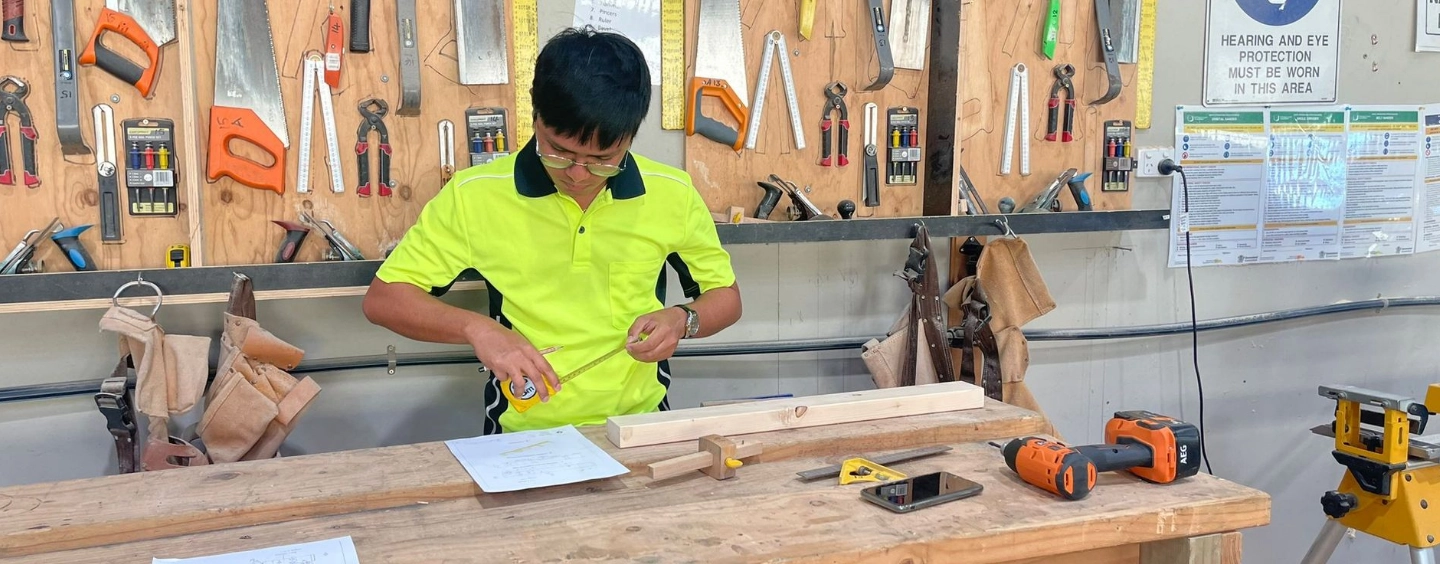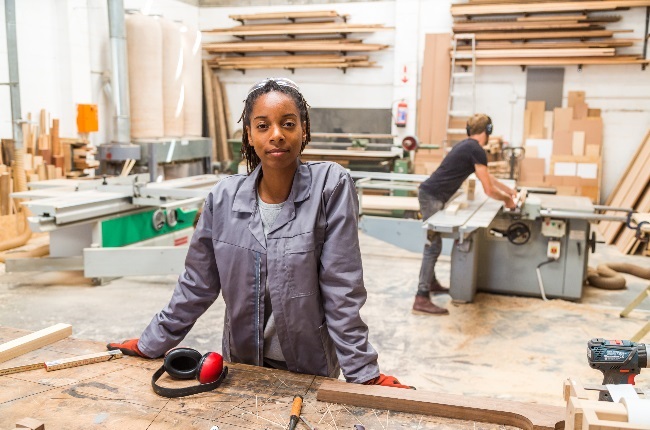
How to Become a Carpentry Course: Expert Tips & Tricks
Are you ready to transform your passion for building into a rewarding skill? Carpentry isn’t just about hammering nails; it’s about creating something lasting with your own hands.
Whether you’re dreaming of crafting beautiful furniture or building homes, a carpentry course is your stepping stone to mastering this timeless trade. But how do you choose the right course and ensure you gain the skills you need? In this guide, you’ll discover everything you need to know to become a successful carpentry student.
From selecting the perfect program to gaining hands-on experience, we’ll walk you through each step. So, grab your tool belt and let’s start building your future together!

Choosing The Right Carpentry Course
Choosing the right carpentry course is a crucial step in your journey to becoming a skilled carpenter. With so many options available, how do you decide which one fits your needs? It’s important to consider factors like accreditation, curriculum, and what you want to achieve in your carpentry career.
Accreditation And Certification
Before enrolling in any carpentry course, check if the institution is accredited. Accreditation ensures the course meets industry standards and provides quality education. A certified course can also boost your resume, making you more attractive to potential employers.
Consider the certification you will receive upon completion. Will it be recognized by employers in your area? A well-recognized certification can open doors to job opportunities and career advancement.
Course Curriculum
Examine the course curriculum carefully. Does it cover essential skills like measuring, cutting, and assembling? A comprehensive curriculum should offer both theoretical knowledge and hands-on practice.
Look for courses that include modern carpentry techniques alongside traditional skills. With technology advancing, understanding digital tools and techniques can set you apart in the field.
Think about the balance between classroom learning and practical workshops. More hands-on experience can better prepare you for real-world carpentry tasks.
Have you considered online courses if attending in person is not an option for you? Some online courses offer virtual workshops and interactive sessions, which can be a flexible way to learn carpentry skills.
Ultimately, the right carpentry course should align with your career goals and learning style. Take the time to research and ask questions before making your decision. Your future as a carpenter depends on this foundational step.
Essential Tools For Carpentry
Choosing essential tools is crucial for learning carpentry skills effectively. Beginners should focus on basic tools like hammers, saws, and measuring tapes. These tools form the foundation for understanding more complex techniques in carpentry courses.
Embarking on a carpentry course is an exciting journey into the world of crafting and building. Before you start, it’s vital to arm yourself with the right tools. Whether you’re a beginner or have some experience, knowing which tools are essential can make your carpentry tasks more efficient and enjoyable. Let’s dive into the must-have tools you’ll need to master your craft.
Basic Hand Tools
The foundation of carpentry lies in basic hand tools. A reliable hammer is your best friend. It’s not just for driving nails; you’ll use it for dismantling and adjusting materials. Opt for a claw hammer with a comfortable grip. A set of screwdrivers is essential. You’ll need both flathead and Phillips head screwdrivers in various sizes. They are indispensable for assembling and disassembling projects. Don’t overlook a good tape measure. Precision is key in carpentry, and a sturdy, retractable tape measure ensures accurate measurements. Choose one with clear markings and a lock feature. Lastly, a utility knife will become a tool you reach for often. From cutting materials to scoring lines, it’s versatile and easy to carry in your pocket.
Power Tools
Power tools take your carpentry skills to the next level. A cordless drill is a powerhouse in a compact form. It’s perfect for driving screws into wood and drilling holes with ease. Look for one with variable speed settings and a comfortable grip. A circular saw is indispensable for making straight cuts. It’s efficient for cutting large sheets of wood down to size. Remember to keep extra blades on hand for different materials. Consider investing in a jigsaw. It’s excellent for making curved cuts and intricate shapes. With the right blade, a jigsaw can handle a variety of materials beyond wood. Finally, a power sander saves time and effort. Achieving a smooth finish on your projects is crucial, and a power sander does the job quickly. Choose between a belt sander for heavy sanding or an orbital sander for fine finishing. Equipping yourself with these essential tools not only prepares you for the tasks ahead but also builds your confidence. Imagine the satisfaction of completing your first carpentry project with precision and skill. What tools do you already have, and which ones will you add to your collection?
Developing Skills Through Practice
Learning carpentry requires hands-on practice. Theory lays the foundation, but practice builds the structure. Engage in various projects and exercises. Improve your skills steadily. Practice turns novices into skilled carpenters.
Hands-on Projects
Hands-on projects provide real-world experience. Start with simple tasks. Build a small shelf or a birdhouse. These projects teach essential skills. Work with different tools and materials. Gain confidence and understanding.
Gradually tackle more complex projects. Construct a table or a chair. Learn about measurements and precision. Mistakes become learning opportunities. Each project enhances skill and creativity. Experience is the best teacher in carpentry.
Skill-building Exercises
Skill-building exercises refine techniques. Practice cutting, sanding, and joining wood. Focus on accuracy and smooth finishes. Exercises improve hand-eye coordination. They prepare you for larger tasks.
Repeat exercises regularly. Consistency is key to improvement. Try different types of joints. Learn dovetail and mortise joints. These exercises expand your skill set. They make future projects easier to handle.
Use feedback to improve. Listen to mentors and peers. Adjust techniques based on advice. Continuous improvement leads to mastery. Skills develop through dedication and practice.

Safety Measures In Carpentry
Safety is crucial in carpentry. It prevents injuries and ensures a smooth workflow. Understanding safety measures is vital for anyone entering this field. Whether you’re crafting furniture or building structures, safety should always be a priority. Let’s delve into key areas of safety in carpentry.
Personal Protective Equipment
Protective gear shields you from harm. Wear safety goggles to guard your eyes. Dust and debris can cause serious eye injuries. Gloves protect your hands from sharp tools and splinters. Steel-toed boots prevent foot injuries from falling objects. Ear protection is essential in noisy environments. It helps avoid hearing loss over time.
Safe Work Practices
Organized workspaces reduce accidents. Keep tools in their designated places. This minimizes trips and falls. Inspect tools before use. Ensure they are in good condition. Report any defects immediately. Use tools properly to avoid mishaps. Follow instructions carefully. Never rush tasks. Patience leads to precision and safety. Maintain clean work areas. Spills and clutter lead to slips and falls.
Building A Successful Carpentry Career
Start your carpentry career by enrolling in a comprehensive carpentry course. Learn essential skills like measuring, cutting, and assembling wood. Gain hands-on experience and build confidence in creating quality wooden structures.
Building a successful carpentry career requires more than technical skills. It involves networking, continued education, and hands-on experience. These elements help you grow and thrive in the industry. Understanding how to effectively integrate these aspects can set you on the path to success.
Networking In The Industry
Networking plays a crucial role in the carpentry field. Connect with fellow carpenters, suppliers, and potential clients. Attend industry events, workshops, and local meetups. These gatherings offer valuable opportunities to meet influential people. Building relationships can lead to job opportunities and partnerships. You can also learn about the latest trends and techniques. Networking helps you stay informed and connected.
Continued Education And Training
Continued education keeps your skills sharp and relevant. Enroll in carpentry courses that focus on advanced techniques. These courses often cover new tools and materials. Staying updated with industry standards is essential. Many organizations offer certifications and workshops. These credentials can enhance your resume and job prospects. Learning never stops in a successful carpentry career.
Tips For Mastering Carpentry Techniques
Mastering carpentry techniques requires patience and practice. It’s not just about cutting and nailing wood. True craftsmanship lies in the details. Precision, creativity, and problem-solving play crucial roles. Let’s explore some essential tips to hone your carpentry skills.
Precision And Accuracy
Precision is key in carpentry. Measure twice, cut once. Always use sharp tools. Blunt tools lead to mistakes. Double-check measurements before cutting. Invest in quality rulers and squares. They ensure accurate lines. Practice using a saw for clean cuts. Focus on straight and smooth edges. Use clamps to hold wood steady. This prevents unwanted movement. Keep your workspace organized. Avoid distractions and errors.
Creative Solutions
Carpentry involves problem-solving. Sometimes, things don’t fit right. Think outside the box. Adapt plans as needed. Use scrap wood creatively. It can save time and money. Experiment with different joinery techniques. They can enhance a project’s look. Don’t be afraid to innovate. Combine traditional and modern methods. It adds uniqueness to your creations. Learn from mistakes. They teach valuable lessons. Keep a journal of ideas. It helps track progress and sparks creativity.

Frequently Asked Questions
What Skills Are Essential For Carpentry?
Carpentry requires skills such as precise measuring, cutting, and assembling materials. Understanding blueprints is crucial. Safety protocols are also important. Additionally, problem-solving and attention to detail enhance craftsmanship. These skills help create high-quality wood structures and furniture.
How Long Does A Carpentry Course Take?
A typical carpentry course can last from a few weeks to several months. Duration depends on the program’s depth and specialization. Some courses offer intensive training, while others provide part-time schedules. It’s essential to choose a program that fits your career goals and availability.
What Are The Career Prospects After Carpentry Training?
Carpentry offers diverse career paths, from construction to custom furniture making. Skilled carpenters can work in residential, commercial, or industrial settings. Many carpenters advance to supervisory roles or start their own businesses. The demand for carpenters remains steady, ensuring job security and opportunities for growth.
Can I Learn Carpentry Online?
Yes, you can learn carpentry through online courses. Many programs offer video tutorials and interactive assignments. While hands-on practice is essential, online courses provide foundational knowledge. They cover topics like tool usage, safety, and project planning. Combining online learning with practical experience is recommended for skill mastery.
Conclusion
Becoming skilled in carpentry requires dedication and practice. Start by enrolling in a course that offers hands-on experience. Learning from seasoned professionals enhances your skills and boosts confidence. Tools and materials become familiar with time, making each project easier. Safety remains vital, so always follow guidelines.
As you progress, your projects will reflect your growth. Carpentry is more than building; it’s about creating with precision. The journey may seem long, but each step brings valuable knowledge. Embrace every opportunity to learn and improve. Soon, you’ll craft pieces that showcase your talent and hard work.





